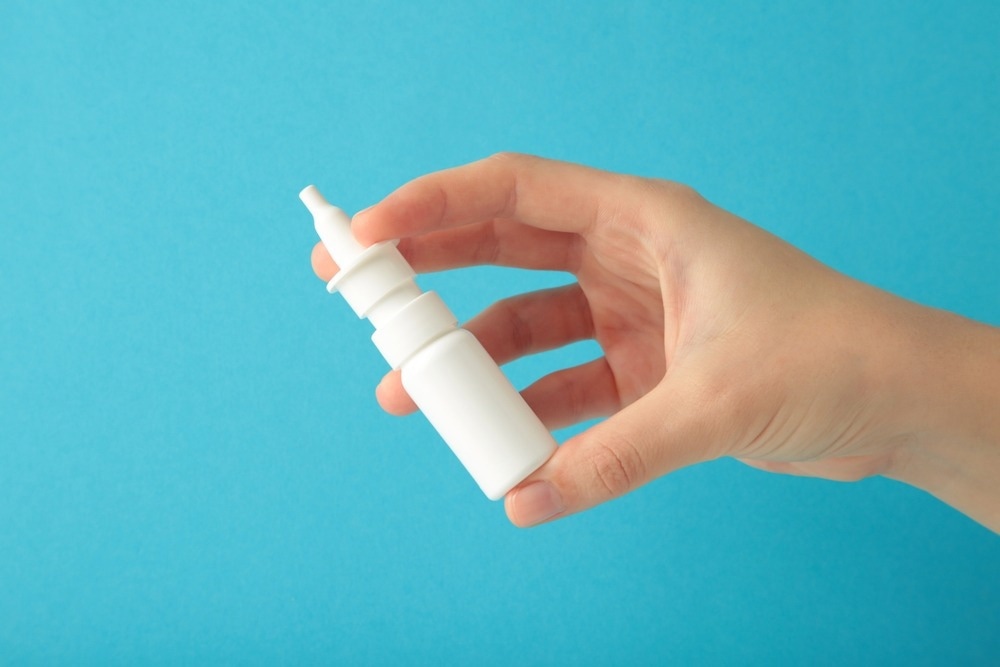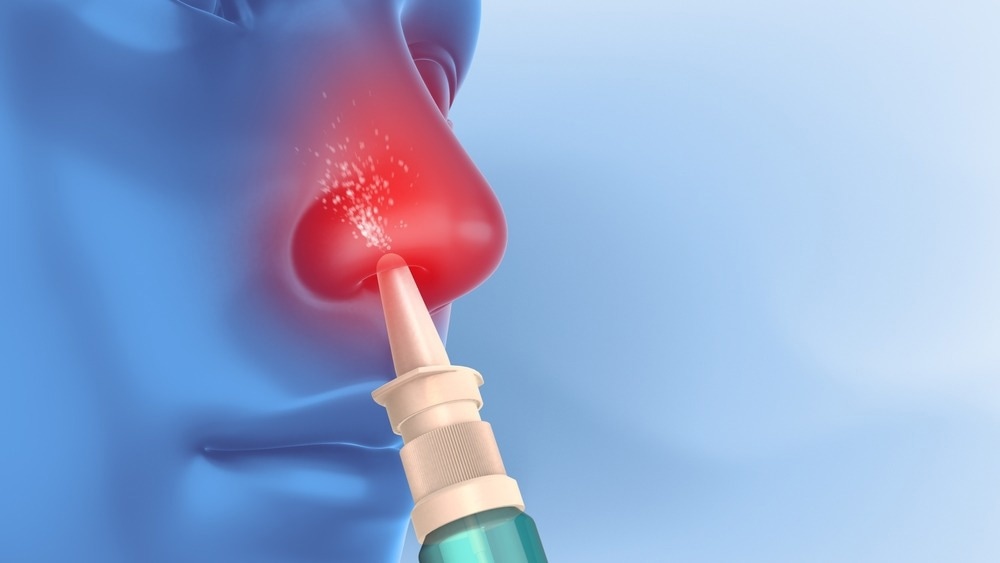Understanding nasal congestion
How nasal sprays work
Saline nasal sprays
Decongestant nasal sprays
Steroid nasal sprays
The rebound effect
Other potential side effects of nasal spray overuse
Tips for responsible nasal spray use
References
Further reading
Understanding nasal congestion
Nasal congestion happens when passages in the nasal cavity are blocked.1 When nasal passages are blocked, nasal breathing can be more challenging, meaning it is harder to breathe through the nose.1
Many different biological agents and cell behaviors can trigger nasal congestion.1,2 Blood vessels, for example, can become inflamed, which in turn causes membranes inside the nose to become swollen.2 Common causes of this include sinus infections, respiratory viruses, influenza, and coronaviruses, as well as allergies like hay fever.1,2,3,4

Image Credit: Mouse family/Shutterstock.com
How nasal sprays work
Nasal sprays can be used to manage congestion.5 Each type works in its own way, depending on its active ingredients and the type of congestion that is being treated. Generally, though, they work by reducing inflammation in the nose’s lining or by dampening the nasal cavity.6,7
Saline nasal sprays
Saline nasal sprays are made of salt water.8 They work by moisturizing the nasal passages, which can be prone to dryness in the winter. Saline sprays can also help to reduce or thin mucus build-up, making the passages less congested.8
Decongestant nasal sprays
Decongestant nasal sprays, on the other hand, tend to be medicated. They can contain active ingredients like pseudoephedrine hydrochloride or oxymetazoline hydrochloride alongside a range of non-active ingredients.9,10
Some active ingredients found in decongestant nasal sprays are vasoconstrictors.10,11 This means they make blood cells contract and shrink temporarily.10,11 In turn, this can decrease inflammation in the nasal cavity temporarily, providing the user with some relief from their congestion.6
Nasal decongestant sprays that contain oxymetazoline or xylometazoline – which belong to a classification of drugs known as alpha-sympathomimetics – can almost paralyze the cilia in the mucus membrane.11 Cilia are hair-like organelles that line various body parts, including the nose.
Steroid nasal sprays
Some types of congestion can also be managed using steroid nasal sprays, which may be available over the counter or on prescription.12,13 They are anti-inflammatory and can treat conditions like sinus infections and non-allergic rhinitis.13 Non-allergic rhinitis causes irritation in the nose, which can lead to blockages.13
Examples of steroid nasal sprays include:
- Fluticasone13
- Beclomethasone13
- Triamcinolone14
- Budesonide13
- Mometasone13
 Nasal sprays work by targeting inflammation or dryness in the nasal passages to relieve congestion. Saline sprays hydrate and thin mucus, while decongestant sprays reduce swelling by constricting blood vessels with active ingredients like oxymetazoline. Steroid nasal sprays treat inflammation more deeply, often addressing chronic conditions, but overuse of decongestants can lead to rebound congestion and other side effects. Image Credit: Cinefootage Visuals/Shutterstock.com
Nasal sprays work by targeting inflammation or dryness in the nasal passages to relieve congestion. Saline sprays hydrate and thin mucus, while decongestant sprays reduce swelling by constricting blood vessels with active ingredients like oxymetazoline. Steroid nasal sprays treat inflammation more deeply, often addressing chronic conditions, but overuse of decongestants can lead to rebound congestion and other side effects. Image Credit: Cinefootage Visuals/Shutterstock.com
The rebound effect
If decongestant nasal sprays are used for more than three days in a row, the user may develop rebound rhinitis medicamentosa (RM).15 This is sometimes also known as rebound congestion.15 It tends to feel like regular congestion but is specifically triggered by the use of some medications, including nasal sprays containing ingredients like oxymetazoline.
Rebound congestion happens when the mucus membrane, or “nasal mucosa,” becomes inflamed by topical nasal decongestants, such as nasal sprays.15 This side effect has been reported from the overuse of ephedrine-derived nasal sprays, like those made with pseudoephedrine.15
Some active ingredients may be less likely to trigger rebound congestion than others, although the findings are mixed.16,17 For example, some research suggests that imidazoline-derived ingredients like oxymetazoline may have a lower risk of rebound congestion, although others disagree.16,17 However, these ingredients can pose other risks, including toxicity to pets, if medications aren’t secured properly.18
Other potential side effects of nasal spray overuse
Besides rebound congestion, other side effects can also occur while using nasal sprays. Some common side effects of using steroid nasal sprays include nosebleeds, infections, headaches, sneezing, and irritation or dryness in the nasal cavity.12,19 Similar side effects can also be seen while using decongestant nasal sprays.6,9
Research suggests that decongestant nasal sprays containing oxymetazoline can cause side effects like a more blocked or running nose, headaches, dizziness, drowsiness, lightheadedness, and cardiovascular effects like an increased heart rate.9 Xylometazoline hydrochloride, another active ingredient used in some decongestant nasal sprays, is also associated with some similar side effects, including nosebleeds, itching, and headaches.20,21
Saline nasal sprays tend to have fewer side effects than their steroid or decongestant-based counterparts.8 Despite this, some sprays may contain other ingredients besides the saltwater solution that can raise medical concerns.22 Some concerns have been raised about the use of some preservatives in saline sprays, like preservative benzalkonium chloride (BKC), and the long-term effects it may have on a type of white blood cell.22
Tips for responsible nasal spray use
Limiting the amount of time the nasal spray is used could also help avoid rebound congestion. Many nasal sprays have an advisory of how long they should be used in their instructions.20,21 When using any medication, these instructions should be followed.
Some people might consider using saline-only sprays to avoid the side effects of medicated decongestant sprays, like rebound rhinitis.22 However, these sprays may not be suitable for everyone. For example, some people may have an allergic reaction to it and require treatment.23 Similarly, some issues that lead to congestion may not be treatable simply by moisturizing the nasal cavity, meaning that saline sprays aren’t useful. If congestion is recurring and long-lasting, medical advice should be sought from a healthcare professional, such as a nurse practitioner, healthcare assistant, or medical doctor, as it could indicate a more serious concern and suggest that the condition needs a different line of treatment.
References
- Naclerio, R. M., Bachert, C., & Baraniuk, J. N. (2010). Pathophysiology of nasal congestion. International Journal of General Medicine, 47-57.
- Harvey, R. J., Roland, L. T., Schlosser, R. J., & Pfaar, O. (2024). Chief Complaint: Nasal Congestion. The Journal of Allergy and Clinical Immunology: In Practice, 12(6), 1462-1471.
- Stewart, M., Ferguson, B. J., & Fromer, L. (2010). Epidemiology and burden of nasal congestion. International Journal of General Medicine, 37-45.
- Eccles, R. (2021). The role of nasal congestion as a defence against respiratory viruses. Clinical Otolaryngology, 46(1), 4-8.
- Meltzer, E. O., Caballero, F., Fromer, L. M., Krouse, J. H., & Scadding, G. (2010). Treatment of congestion in upper respiratory diseases. International Journal of General Medicine, 69-91.
- NHS. (2017, October 18). Decongestants. Retrieved from nhs.uk website: https://www.nhs.uk/conditions/decongestants/
- NHS Choices. (2018, September 7). Non-allergic rhinitis. Retrieved from nhs.uk website: https://www.nhs.uk/conditions/non-allergic-rhinitis/
- Santoro, E., Kalita, P., & Novak, P. (2021). The role of saline nasal sprays or drops in nasal hygiene: a review of the evidence and clinical perspectives. Rhinology Online, 4(4), 1-16.
- Dokuyucu, R., Gokce, H., Sahan, M., Sefil, F., Tas, Z. A., Tutuk, O., ... & Cevik, C. (2015). Systemic side effects of locally used oxymetazoline. International Journal of Clinical and Experimental Medicine, 8(2), 2674.
- Wang, J., Mao, Z. F., & Cheng, L. (2024). Rise and fall of decongestants in treating nasal congestion related diseases. Expert Opinion on Pharmacotherapy, 25(14), 1943-1951.
- Johnson, D. A., & Hricik, J. G. (1993). The pharmacology of α‐adrenergic decongestants. Pharmacotherapy: The Journal of Human Pharmacology and Drug Therapy, 13(6P2), 110S-115S.
- McDonnell, J., Weller, K., & Pien, L. C. (2020). Safety of intranasal steroids: an updated perspective. Current Allergy and Asthma Reports, 20, 1-8.
- NHS. (2017b, October 18). Steroid nasal sprays. Retrieved from nhs.uk website: https://www.nhs.uk/conditions/steroid-nasal-sprays/
- Kalpaklioglu, A. F., & Kavut, A. B. (2010). Comparison of azelastine versus triamcinolone nasal spray in allergic and nonallergic rhinitis. American Journal of Rhinology & Allergy, 24(1), 29-33.
- Wahid, N. W. B., & Shermetaro, C. (2023). Rhinitis Medicamentosa. In StatPearls. StatPearls. Retrieved from https://www.ncbi.nlm.nih.gov/books/NBK538318/
- Watanabe, H., Foo, T. H., Djazaeri, B., Duncombe, P., Mackay, I. S., & Durham, S. R. (2003). Oxymetazoline nasal spray three times daily for four weeks in normal subjects is not associated with rebound congestion or tachyphylaxis. Rhinology, 41(3), 167-174.
- Hochban, W., Althoff, H., & Ziegler, A. (1999). Nasal decongestion with imidazoline derivatives: acoustic rhinometry measurements. European Journal of Clinical Pharmacology, 55, 7-12.
- Bahri, L. E. (2015). Imidazoline decongestant toxicity in pets. Retrieved November 15, 2024, from Vet Times website: https://www.vettimes.co.uk/article/imidazoline-decongestant-toxicity-in-pets/
- Bridgeman, M. B. (2017). Overcoming barriers to intranasal corticosteroid use in patients with uncontrolled allergic rhinitis. Integrated Pharmacy Research and Practice, 109-119.
- EMC. (2023). Sudafed Blocked Nose Spray - Patient Information Leaflet (PIL) - (emc). Retrieved November 15, 2024, from Medicines.org.uk website: https://www.medicines.org.uk/emc/product/1722/pil#about-medicine
- EMC. (2024). Otrivine Adult Nasal Spray - Patient Information Leaflet (PIL) - (emc). Retrieved November 15, 2024, from Medicines.org.uk website: https://www.medicines.org.uk/emc/product/6155/pil#about-medicine
- Boston, M., Dobratz, E. J., Buescher, E. S., & Darrow, D. H. (2003). Effects of nasal saline spray on human neutrophils. Archives of Otolaryngology–Head & Neck Surgery, 129(6), 660-664.
- Drugs.com. (2024). Saline Mist Spray: Indications, Side Effects, Warnings. Retrieved from Drugs.com website: https://www.drugs.com/cdi/saline-mist-spray.html
Further Reading
Last Updated: Nov 21, 2024